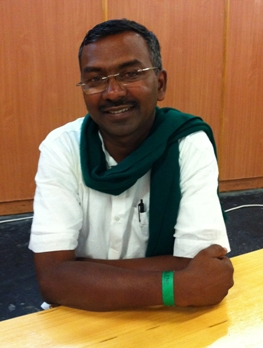‘Food sovereignty means self reliance and self respect’
18 August 2011
Dan Iles, food activist and WDM’s south-west mobiliser interviews Indian activist S. Kannaiyan at the Nyeleni forum to build a food sovereignty movement in Europe.
Indian activist S. Kannaiyan
At Nyeleni 2011 there is such a diversity of delegates from across Europe and indeed the world. In the first of a series of interviews, I am trying to give the international perspective on food sovereignty.
I spoke to one of a few non-European delegates that were able to make it over to the conference, S. Kannaiyan from Tamil Nadu, south India.
There are also delegates from Mali, Canada, Nigeria, the US, Mozambique and Azerbaijan. I wanted to give you an idea of why this delegate is so passionate about food sovereignty, what the challenges are in his country and what is being done locally to combat these challenges.
What does food sovereignty mean to you?
Food sovereignty means to me the self-respect which comes from self reliance in food production and distribution. Local food production and distribution rather than food produced in one continent and transported all across another continent and distributed. I am not against international trade in food per se; when it is absolutely needed you can import and export to help other countries, but this should not be led by corporations. This is leading to the imbalance of food production and distribution which completely changes local food production. For example, India is importing palm oil from Malaysia, a small country compared to India. So, palm oil enjoys tax-free imports in India and also government subsidy in the name of food security, to feed the hungry. This justification has killed the local diverse oil seed production and made India dependent on imports.
The other example is pulses. The farmers in Karnataka are producing pulses, but those farmers are not getting fair prices. This is driving some farmers to suicide. But the government, instead of encouraging local production, is importing pulses from other countries like Burma and some African countries, and this trade is mainly done by the corporations. So it is dangerous. The tendency now is: India is growing and we can buy food anywhere if it is cheaper. So these cheaper imports mean importing disaster to the Indian farming system. Meanwhile countries like Malaysia are expanding palm oil cultivation and destroying their own diversity.
Trade is not going to solve the food crisis in the future.
This is why food sovereignty means local production and local distribution, self-sufficiency and self-respect and decisions on agricultural policies made by the people, not just farmers.
What examples of projects enacting food sovereignty are there in India?
I can’t say that the trend is yet towards ensuring food sovereignty but there is one example of good policy in Kerala. The Kerala government passed an act that means wetlands cannot be converted for other purposes other than agriculture. There are also good mechanisms like price support price for certain crops, where crops can be purchased by the government, protecting farmers.
Of course they have their own historic struggle for rights in southern India. They have squatted some lands and claimed their rights over it. I was so impressed to see that about 4,000 acres of land from the government corporations was reclaimed by the tribal communities in Kerala. 4,000 families each gained one acre. But otherwise, farmers are losing their land. The government is still using the colonial British land acquisition act from 1894. By using this act the government is taking over land used by farmers and giving it to corporations. There is not much opportunity for land acquisition for the landless.
What is the future of food sovereignty in Tamil Nadu?
Tamil Nadu is one of the leading states in terms of being industrialised. Now in Tamil Nadu, smallholders are not able to get workers for their lands because workers are being drawn to opportunities in the neighbouring cities. So farmers are selling their lands and getting out of agriculture. Young people who are educated are not interested in farming because it has no apparent future.
Local universities are facilitating multinational companies to access the universities and to penetrate into trade in Tamil Nadu. The university is supporting their research projects and transferring the farmers’ seed varieties to the corporations like Monsanto by material transfer agreements in the name of collaborative national research. I can simply say it is the westernisation of Indian agriculture. So whatever the practice in India is, it is considered useless and whatever the practice in Europe is it considered very efficient. For example, tractors are being introduced when smallholder farmers only need small machines to help them. It is clear from this forum that this technology has failed, it can suit big companies but not peasant farmers. The US model of industrialised agriculture is no longer viable, even in the global north. Yet they are still trying to introduce it.
How did the 2008 food crisis affect farmers and consumers in Tamil Nadu?
I can say that the crisis felt across the world was luckily not felt in Tamil Nadu or in south India. I did a small survey of shopkeepers and consumers. However, in Tamil Nadu we have a very good food distribution system. At present, food is distributed for free. These systems are needed for the poor people of India to survive.
S. Kannaiyan is an international delegate from Tamil Nadu, who represents an organisation called South Indian Coordination Committee of Farmers’ Movements. It is a coalition of different farmers’ movements in south India, from the states Tamil Nadu, Karnataka and Kerala.

